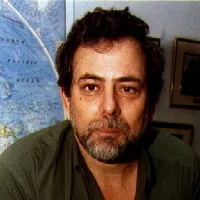| Gustavo Gorriti La Prensa |
| Following is the text of remarks by Gustavo Gorriti, a Peruvian investigative reporter with La Prensa in Panama, upon receiving the 1998 CPJ International Press Freedom Award in ceremonies November 24, 1998, at 9 p.m. at the Waldorf-Astoria in New York.
We journalists, historians of first resort, do not just report our time and circumstance, but are also shaped by them. In Latin America, where the extraordinary is the rule, the extraordinarywhether you want it or not rules your work, and often your life. I became a full-time journalist about 20 years ago. From the outset, I began to report the effect upon Peru of the interaction of the infra-red Marxism of the Shining Path and the ultra-violet capitalism of drug trafficking. An interaction that would engulf my country in some of the more tragic years of its history. |
 Because of that, the need to accurately report reality was great. But, when you try to work as a normal journalist in a country made dysfunctional by corruption, violence or both, truththat is the right representation of factswill harm powerful individuals, who in many cases are adept in the administration of fear and intimidation or death. In my case, as in the case of many other colleagues, the decision not to let fear become an editor didn’t require much bravery. When intimidation becomes a factor in reporting, journalism is thoroughly undermined. You don’t choose your circumstance, but you can certainly choose your profession. I wanted to be a journalist, so I made up my mind early on and never looked back.
Because of that, the need to accurately report reality was great. But, when you try to work as a normal journalist in a country made dysfunctional by corruption, violence or both, truththat is the right representation of factswill harm powerful individuals, who in many cases are adept in the administration of fear and intimidation or death. In my case, as in the case of many other colleagues, the decision not to let fear become an editor didn’t require much bravery. When intimidation becomes a factor in reporting, journalism is thoroughly undermined. You don’t choose your circumstance, but you can certainly choose your profession. I wanted to be a journalist, so I made up my mind early on and never looked back.
Throughout Latin America, many other journalists had taken the same decision, and together, sometimes without realizing it, were not just reporting but making history; changing, perhaps forever, the standards of transparency and accountability in the Hemisphere, while often paying the price for it. But just look at some of the results. In Mexico, power is no more a guarantee of impunity, much less respectability. In Guatemala, a president wanted to imitate Fujimori and become a dictator; the resistance of the independent press galvanized the rest of society, the would-be dictator was ousted and Democracy was saved. In Venezuela and Brazil, two presidents had to leave office after the press exposed damning evidence of corruption. In Argentina and Panama, dreams of re-election by current presidents were shattered after repeated journalistic exposs about undeniable corruption in public office. In Peru, although Fujimori is still in power, the independent press uncovered human rights atrocities and drug trafficking connections at the highest levels of the intelligence service and its chief, Vladimiro Montesinos, so crucial for Fujimori’s authoritarian regime. So, the price is high, yes, but certain things are changing, have changed already.
In the past, we endured with an almost fatalistic abandon the retaliation of the powerful and corrupt. It was with passive bravery that threats, violence, even murder were faced. You did what you had to do, and awaited the consequences. This is not the case anymore. We have made great strides in defending ourselves, and we do not have to report only tragedies and setbacks, but also some progress and some victories, too.
Journalists have successfully brought cases of judicial harassment before international courts and compelled governments to reverse their course of action. International pressure on many fronts was decisive last year in defeating Panama’s president’s attempt to expel me from the country. And the relentless pressure of Argentinian journalists eventually brought the downfall and suicide of the man who had ordered the assassination of photographer Jos Luis Cabezas. Peruvian journalists have organized an emergency toll-free line to be used around the clock, around the year by our colleagues in the provinces. And Mexican journalists are making slow but steady improvement in organizing themselves for self-defense, which means to bring an intense spotlight on the perpetrators of any attack against the press.
Needless to say, this perspective for an overall improvement is due in great measure to the work of international organizations, chiefly among them the Committee to Protect Journalists. Several times during my career, the international pressure in which CPJ took a central role was decisive in saving and eventually winning the day. When we (and I am certain I speak on this point for most of the independent journalists of Latin America) go out to confront the ruthless and powerful, we count upon CPJ. We count upon it not just as an intangible although effective shield, but as a source of strength, of resonance, and if the worst happens, as a focus of relentless pressure for accountability and justice.